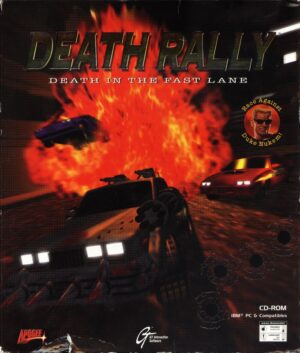Retro Replay Review
Gameplay
Force 21 delivers a solid real-time tactics (RTT) experience that strips away traditional base-building mechanics and focuses purely on battlefield maneuvers. From the moment you start a mission, you have direct control over a limited roster of units—up to 16 vehicles or infantry squads drawn from more than 40 distinct types. This restriction forces you to think tactically about every deployment, ensuring that each unit has a critical role in your battle plan.
(HEY YOU!! We hope you enjoy! We try not to run ads. So basically, this is a very expensive hobby running this site. Please consider joining us for updates, forums, and more. Network w/ us to make some cash or friends while retro gaming, and you can win some free retro games for posting. Okay, carry on 👍)
The game’s mission structures are varied and challenging. Over 30 single-player missions take you across deserts, urban environments, and mountainous terrains on the Kazakhstan–China border, each with unique objectives like ambushes, convoy escorts, and defensive strongholds. The absence of unit production means that every casualty hurts, so you must scout ahead, leverage terrain features, and coordinate combined-arms assaults to minimize losses and achieve victory.
Multiplayer adds further depth with 10 dedicated maps for up to four players. Here, tactical acumen is tested against human opponents who can exploit any weakness in your setup. The inclusion of a map editor provides near-limitless replayability, letting you design custom battlefields or recreate real-world hotspots. Whether you’re refining your opening salvo or scripting elaborate ambushes, the editor empowers you to tailor the experience to your strategic tastes.
While the controls are generally intuitive—complete with drag-to-select and context-sensitive orders—there is a learning curve when it comes to micromanaging specialized units like attack helicopters or anti-air platforms. Proper hotkey use and unit grouping become essential for keeping pace with faster-skirmishing enemies. Nonetheless, once you master the interface, orchestrating synchronized assaults and pulling off daring flanking maneuvers feels immensely rewarding.
Graphics
Force 21’s presentation may not rival the latest AAA titles, but for its era, it showcases a respectable 3D engine that brings large-scale combat to life. Unit models are distinct and easily recognizable on the battlefield—M1 Abrams tanks look chunky and armored, while PLA Type 98s have a sleeker silhouette. This visual clarity is crucial when commanding multiple units and issuing rapid-fire orders under pressure.
Environments vary from sweeping desert plains to dusty urban sprawls, with simple but effective terrain elevation that influences line of sight and movement. Shadows are cast realistically under overhead sun, and textures—though a bit low-res by modern standards—still convey the rugged terrain of Kazakhstan and the stark industrial complexes along its border. Effects like dust clouds kicked up by roving convoys and muzzle flashes during firefights add extra punch to engagements.
One area where Force 21 shines is its zoom functionality. You can pull back for a birds-eye view of the entire battlefield or zoom in close to watch missile trails streak across the sky. This dynamic camera not only aids in strategic oversight but also enhances immersion, letting you feel the tension of a close-quarters firefight or the awe of an armored column pushing through a mountain pass.
Story
The narrative premise of Force 21 throws you into a near-future conflict set in 2015, as China invades resource-rich regions of Kazakhstan and the United States deploys an elite task force codenamed “Force 21” to stem the advance. While the campaign doesn’t feature cinematic cutscenes or deep character arcs, it effectively unfolds through briefing screens, mission debriefs, and in-field radio chatter that convey urgency and geopolitical stakes.
Each side’s missions are tailored to their strategic doctrines. Playing as the PLA, you’ll spearhead rapid armored thrusts and establish forward operating bases; as the US Force 21 commander, you emphasize precision strikes, air support, and techno-centric reconnaissance. This duality gives the campaign a sense of balance and replay value, since completing the same objective with differing unit capabilities and tactics feels like tackling a brand-new challenge.
Although the story framework is relatively straightforward, it strikes the right tone for a military tactics game: professional, focused, and grounded in a plausible near-future scenario. Dialogue is concise and mission-focused, which keeps pacing brisk and prevents narrative bloat. You won’t find sprawling cutscenes here, but the mission variety—from defending mountain passes to rescuing downed pilots—helps maintain dramatic tension throughout the 30-mission run.
Overall Experience
Force 21 stands out in the RTT genre by honing in on tactical decision-making rather than base management. Its combination of diverse unit types, challenging mission designs, and a functional map editor gives it substantial longevity. Whether you’re a veteran strategist or a newcomer intrigued by modern military conflict, there’s ample depth to explore.
The user interface strikes a solid balance between accessibility and control complexity. Beginners can jump in using simple waypoint commands, while veterans will appreciate the precision offered by hotkey grouping and formation orders. Multiplayer skirmishes further extend the game’s lifecycle, offering intense player-versus-player clashes that reward foresight and adaptability.
Graphically, Force 21 remains respectable for its age, and its modular mission editor ensures that community-driven content can keep the title feeling fresh. The narrative, while not blockbuster-level, provides a coherent backdrop that contextualizes each tactical puzzle without dragging you through unnecessary exposition. Overall, Force 21 delivers a refined RTT package that will appeal to strategy fans seeking focused, unit-based combat with both historical and speculative flair.
 Retro Replay Retro Replay gaming reviews, news, emulation, geek stuff and more!
Retro Replay Retro Replay gaming reviews, news, emulation, geek stuff and more!





Reviews
There are no reviews yet.